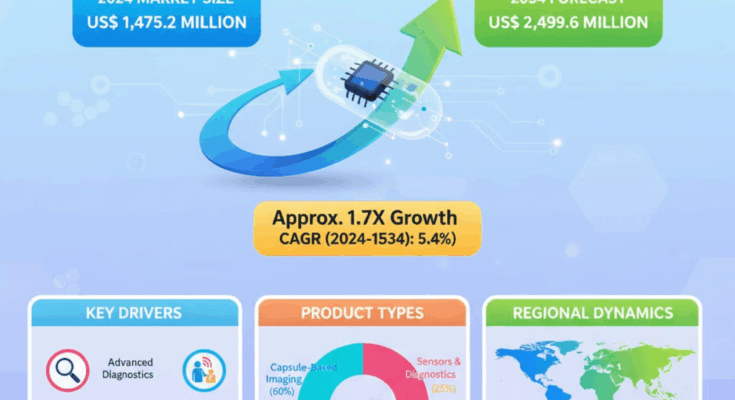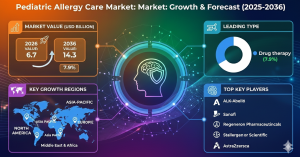The global Ingestible Smart Pills Market is quietly leading a revolution in medical diagnostics. Once a futuristic concept, these capsule-sized devices have matured into a viable, highly efficient tool for clinicians seeking precision, comfort, and real-time data. According to Fact.MR’s latest analysis, the market is valued at USD 1.48 billion in 2024 and is projected to expand at a CAGR of 5.4%, reaching approximately USD 2.5 billion by 2034. The figures underscore a clear message — the age of non-invasive medical intelligence is not just coming; it’s here.
A Shift from Invasive to Intelligent
The surge in demand for ingestible smart pills is driven by a global healthcare system pivoting toward non-invasive diagnostics. Traditional endoscopy and imaging procedures, while effective, often carry discomfort and risk. Smart pills, equipped with microscopic cameras, sensors, and wireless transmitters, provide a patient-friendly alternative — allowing physicians to visualize, measure, and monitor the gastrointestinal tract without sedation or recovery time.
Rising incidences of gastrointestinal disorders, including Crohn’s disease and colorectal cancer, have intensified the need for such innovations. Aging population Ingestible Smart Pills Market Poised for a New Era of Diagnostic Innovation particularly in North America, Europe, and East Asia, further compound the demand. The capability to collect comprehensive diagnostic data while maintaining patient comfort has positioned smart pills as a disruptive force in clinical practice.
Technology: The Real Catalyst
Behind the market’s momentum lies a steady cadence of technological breakthroughs. The miniaturization of components, coupled with advances in imaging resolution, has made ingestible capsules smarter and more capable. Recent iterations feature high-definition imaging, improved power efficiency, and enhanced data transfer reliability.
Artificial intelligence now plays a decisive role — algorithms assist in image analysis, anomaly detection, and real-time reporting, dramatically improving diagnostic precision. As healthcare moves deeper into data-driven ecosystems, the integration of AI transforms ingestible smart pills from diagnostic tools into connected data platforms, capable of linking directly with hospital information systems and cloud-based analytics.
The intersection of med-tech and software innovation is where the next competitive wave will rise. Companies that can synchronize capsule technology with intelligent data systems are expected to shape the next decade of growth.
Regional Leaders and Growth Hotspots
North America remains the dominant market, accounting for nearly 48% of global revenue in 2024. The region’s robust R&D ecosystem, advanced healthcare infrastructure, and rapid adoption of digital diagnostics continue to support expansion. The United States, in particular, stands out as an innovation hub, hosting leading players and research institutions.
East Asia follows closely, with China commanding over half the regional share. Investment in healthcare modernization, the rising middle-class demand for quality care, and a growing appetite for preventive diagnostics make China a pivotal growth engine. Europe maintains a steady trajectory, supported by a strong regulatory framework and widespread acceptance of non-invasive procedures. Meanwhile, emerging markets in Latin America and the Middle East are opening new pathways for adoption, aided by improvements in hospital technology and telemedicine infrastructure.
Competitive Landscape: Intelligence Meets Engineering
The market’s competitive terrain is defined by collaboration between engineering precision and data intelligence. Prominent players include Given Imaging (a Medtronic company), Olympus Corporation, CapsoVision, BodyCap Medical, IntroMedic Co., Ltd., Check-Cap, and Proteus Digital Health.
These companies are investing heavily in R&D to enhance imaging clarity, develop multi-sensor capsules capable of measuring pH, temperature, and motility, and expand remote monitoring functions. Several are also shifting toward cloud-based workstation models, enabling clinicians to access diagnostic results remotely — a move aligned with the broader telehealth trend.
Mergers, partnerships, and licensing deals are reshaping the competitive landscape. For instance, device manufacturers are increasingly joining forces with AI-software firms and healthcare data platforms to create holistic diagnostic ecosystems. The emerging business model is less about selling a capsule and more about providing a comprehensive diagnostic service.
Challenges: The Barriers to Scale
Despite its promise, the ingestible smart pills market is not without friction. Regulatory approvals remain a major hurdle, with agencies demanding stringent evidence on safety, retention rates, and data accuracy. Data privacy also looms large, as patient information travels through wireless systems to cloud servers.
High device costs can limit adoption in developing economies. Additionally, despite advances in miniaturization, challenges such as battery life, capsule retention, and image transmission consistency continue to test engineers. For widespread clinical adoption, manufacturers must not only deliver technological excellence but also prove cost-effectiveness in real-world hospital settings.
Recent Developments: A Glimpse into the Future
Recent breakthroughs have extended the frontier of what ingestible smart pills can achieve. Some capsules now offer multi-functional sensing — capturing biochemical data alongside imaging. Others feature biodegradable materials, eliminating the need for retrieval and improving patient safety. The integration of wireless power transfer and rechargeable micro-batteries is also emerging, hinting at a future where capsules can stay functional longer, enabling continuous monitoring.
Collaborations between research institutions and device manufacturers are fast-tracking innovation. Universities in Japan and South Korea, for example, are pioneering ultra-thin sensors and optical fibers that could soon make real-time GI tract monitoring more detailed than ever.
Browse Full Report: https://www.factmr.com/report/ingestible-smart-pills-market
Outlook: The Decade of Digestive Intelligence
From an editorial standpoint, the ingestible smart pills market represents a rare convergence of medical need, engineering innovation, and digital transformation. The next ten years will see a deeper fusion of AI, materials science, and biotechnology. Smart pills will evolve beyond diagnosis — toward predictive monitoring, drug delivery, and even micro-therapeutics.
As reimbursement frameworks expand and device affordability improves, adoption will spread rapidly beyond top-tier hospitals into outpatient and telemedicine channels. The companies that master end-to-end diagnostic ecosystems — combining capsule design, software analytics, and data security — will ultimately define the next chapter of medical diagnostics.



